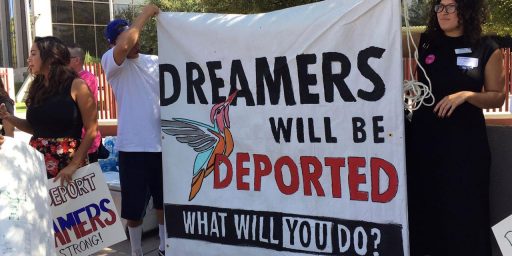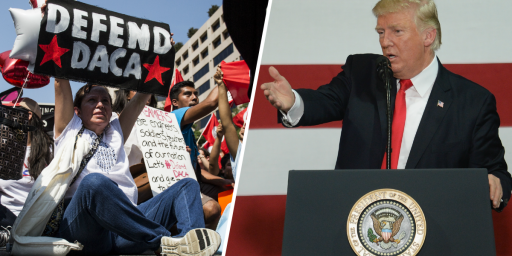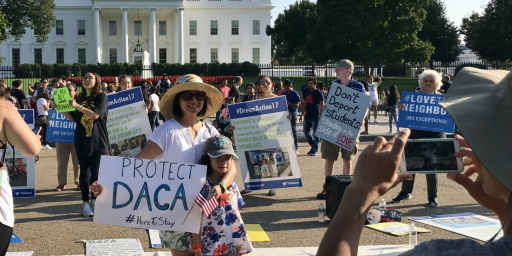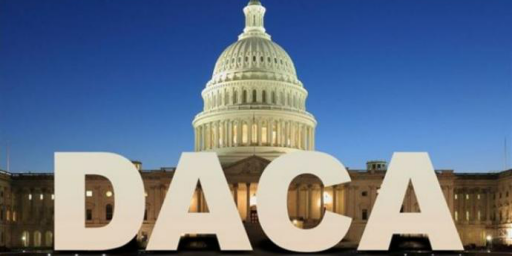Yes, DACA Beneficiaries And Other Illegal Immigrants Should Be Able To Become Citizens
One of the main objections that many on the right seem to have to proposals to legalize DACA beneficiaries and other illegal immigrants is the idea that they could eventually become citizens. There's no good reason they shouldn't be able to do so.
One of the issues that appears to be complicating negotiations on Capitol Hill over a resolution to the status of the beneficiaries of the Deferred Action For Childhood Arrivals (DACA) program as well as others who were brought to the United States as children is the question of whether they should eventually be eligible for what’s called “a path to citizenship.” The plan that the Trump Administration put forward last month, for example, would both expand the number of people eligible for DACA-like protection to the point where it would cover some 1.8 million people. On the other side of the ledger, of course, the Administration plan as announced in January would also include provisions such as funding for Trump’s border wall, the elimination of the visa lottery, and changes to legal immigration aimed at restricting so-called “chain migration,” which is a reference to the fact that current immigration law allows people here legally to sponsor family members for immigration. Now, The Los Angeles Times reports that the Administration may be willing to accept something different:
As the Senate prepares to begin a free-wheeling debate over immigration next week, White House officials have begun floating a possible compromise idea — a pledge to maintain legal immigration at current levels, about 1.1 million people a year, for more than a decade.
President Trump has proposed a series of measures, including restrictions on family unification, which he calls “chain migration,” and an end to the visa lottery, that critics say ultimately could cut legal immigration to America by 40% or more.
But a White House official said Saturday that the Trump administration is working with allies in the Senate on a proposal that would create a path to citizenship for an estimated 1.8 million people who were brought to the country illegally as children, and that would clear the backlog of nearly 4 million sponsored relatives who currently are waiting for green cards.
The combined effort, officials said, would effectively make up for the cuts in other immigration categories for about 13 years, the official said. After that, if Congress takes no additional action to add or expand visa categories, the total number of people allowed to resettle in the U.S. each year likely would decline by hundreds of thousands.
The outline began emerging early this week when John Kelly, the White House chief of staff, and Kirstjen Nielsen, the secretary of Homeland Security, met with a half a dozen or so Latino Republicans at the White House and said the administration was prepared to ensure that overall immigration levels would remain steady.
The shift shows the White House is feeling out the contours of a possible compromise as lawmakers prepare for marathon immigration debates on the Senate floor next week over how to protect from deportation — and possibly provide legal status for — the estimated 1.8 million people brought to the country illegally as children.
As I’ve noted before, while a plan like this might make it through the Senate, especially the part that provides legal status for DACA beneficiaries and others in the same situation as them who may not have been eligible to apply for DACA status for one reason or another would probably pass the Senate, the House of Representatives is another matter entirely. Large blocs of Republicans in the House are far more conservative than Senate Republicans generally are, and one of their major objections to both the original Trump plan and to suggestions that have come out of the Senate is the idea that DACA beneficiaries, or indeed anyone who is currently in the country illegally, becoming eligible for citizenship at any point in the future. Jazz Shaw at Hot Air summarizes the arguments of those House Republicans, and many conservatives, regarding the idea of a path to citizenship in his post today about these reports of a possible compromise being negotiated between the White House and Senate Republicans and Democrats:
Some trading was always going to be required to achieve conservative goals on this issue, but there’s also such a thing as priming the pump too hard. The Democrats claim they want to save the Dreamers from deportation. That can be achieved with Permanent Resident Alien status, not a pathway to citizenship and voting. And that four million number in terms of sponsored relatives is way too high. Restricting it to spouses, underage children and possibly parents could trim it down to a more manageable number.
In any event, those are all details which could be worked out in negotiations this week.The possibility of a deal is hanging in front of us, provided it includes the wall and the other priorities mentioned above. But if the President gets a bit too generous in his eagerness to get something signed, the GOP needs to either quietly curb his enthusiasm a bit or walk away.
Jazz has expressed objections to the idea of a path to citizenship for DACA beneficiaries for DACA beneficiaries in the past — see here and here, for example — and the argument he makes here has also been made by many conservative pundits and Republicans on Capitol Hill. Essentially, the argument appears to be that people who are in the country illegally, including DACA beneficiaries and others similarly situated, should not be able to receive the benefit of eventually become citizens precisely because they are in the country illegally. In many cases, when pressed to provide an argument why this should be the case, the argument usually ends up being nothing more than that, as if the position were so axiomatically true that it doesn’t really need to be supported any further. In other cases, the argument is far more blunt, namely that this group of people should not be eligible to become citizens because they would be eligible to vote and would most likely end up voting for Democratic candidates. While I’m not suggesting that this is the real justification that everyone who takes this position makes for their position, I’ve seen and heard it made often enough by people on the right that it is certainly one of the predominant reasons why the idea of a path to citizenship for illegal immigrants generally or DACA beneficiaries specifically should be rejected out of hand. This, of course, is little more than a blatantly partisan argument based more on concern for the political fortunes of the Republican Party than on any real public policy argument. While there’s nothing per se wrong with making this kind of argument, it does tend to lead to the conclusion that there is no real logical, policy-based reason why there should be any bar to eventual citizenship for DACA beneficiaries or any other illegal immigrants provided they meet the criteria set forth in the law and successfully meet the criteria for citizenship itself.
As it stands, of course, the conservative position regarding citizenship for illegal immigrants is one that is not held by most Americans. According to many polls taken over the last five years or longer, the majority of Americans and even the majority of self-identified Republicans support a path to citizenship for both DACA beneficiaries specifically and illegal immigrants generally. I’ve made note of the results of many of these polls in posts that can be found here, here, here, here, here, here, here, here, here, here, here, here, here, and here. This issue, of course, is just one of the examples of the extent to which the hardline position that conservatives continue to take on immigration issues is out of step with the rest of the country, and it’s one of the many reasons why Republicans continue to lose ground with Latino voters, especially younger Latino voters who will become more and more of an important segment of a voting bloc that is only going to grow over the coming years. Taken in that light, I suppose that it’s understandable why many on the right would take the position that people who are in the United States illegally should never be allowed to become citizens. Given current voting patterns, such a prospect would be bad news for the GOP in many states, or even worse news considering that many states such as Arizona, Virginia, Georgia, and Florida are seemingly destined to become less hospitable to Republicans in the future unless the GOP becomes more palatable to Latino voters.
In reality, of course, isn’t any valid policy-based or moral argument against the idea that DACA beneficiaries, or indeed anyone who is in the country illegally, should eventually be allowed to become citizens provided that they meet the criteria. As noted above, the general idea for solving the immediate DACA problem appears to be one that would allow the beneficiaries of the program, and possibly many others, apply to become Permanent Resident Aliens, something typically called “getting a Green Card” due to the fact that the identity card that someone in this status receives is colored green. As it stands, there are very few differences between being a citizen and being a Permanent Resident. Permanent Residents are eligible for nearly all of the same benefits and legal protections that citizens are, except that only citizens are permitted to vote in elections. People in both statuses are both protected by the Constitution and the Bill of Rights, for example, although it’s worth noting that the vast majority of the rights granted under the Constitution are available to everyone in the country including people who are here illegally. Another difference is that Permanent Residence are required to renew their status roughly every ten years and could be subject to deportation if they commit certain crimes, though that is typically limited to felonies.
More importantly, every person who is granted Permanent Resident Alien Status eventually becomes eligible to apply for citizenship. In most cases, it requires that they have that status for at least five years and that they have resided in the United States without interruption for at least that long. At that point they can apply for citizenship if they choose to, a process that requires completion of an application process, a biometric scan, an interview, and a test that demonstrates that they have knowledge of the history and laws of the United States. Assuming they can complete this process successfully, applicants are sworn in either by an employee of the U.S. Citizenship and Immigration Services or by another authorized official at one of the many mass citizenship ceremonies that are held around the country, including one that takes place at Thomas Jefferson’s Monticello home every July 4th and typically presided over by a Federal Judge.
If illegal immigrants generally or DACA beneficiaries specifically are indeed granted Permanent Resident status, and there’s no good reason they shouldn’t be as part of a broader immigration reform package, I see no reason why they too should not be allowed to eventually apply for citizenship as well. This seems to be especially true for DACA beneficiaries and others who were brought to this country illegally ass children. These people have essentially lived their entire lives in the United States and have no real connection to their “home” countries. In most cases, they are almost fully assimilated into American culture and are often more fluent in English than they are in their “native” language. Were they forced to return to their “home” country they would be akin to a fish out of water and would have to figure out how to live in a nation they have little connection to while simultaneously leaving behind family and friends they have made here in the United States. More importantly, during their time here in the United States most of these people have contributed to the economy and led productive and law-abiding lives. If they were permitted to stay and eventually become citizens, they would be able to contribute even more.
Perhaps the solution to the current political dilemma would be that people in here illegally, where DACA-like people or not, who are granted Permanent Resident Status would have to wait a bit longer before they are eligible to apply for citizenship. Some have suggested a period ranging from 10-12 years. I see no good reason to permanently bar them from eligibility. Indeed, to do that would be to create a not insubstantial group of what would essentially amount to second-class citizens, something that hardly seems fair or just under the circumstances.







It’s rare to see a triple-negative in the wild.
if i’m reading that correctly it means DACA recipients shouldn’t be allowed to be citizens.
Republicans should simply adopt the spirit of Ronald Reagan on immigration, legal or illegal.
The is no valid policy-based or moral argument against granting them a path to citizenship? None?
It creates a second path to citizenship that starts with bypassing our immigration laws — which means that more people are encouraged to come in illegally. Repeated amnesties for illegal immigrants makes following the “right” path a fool’s game.
The DACA kids are something of a special case, since they didn’t choose to come here, but their parents chose to bring them, would their parents have chosen to bring them if they knew they were always going to be a second class? Maybe, maybe not.
We created this problem through lax enforcement on businesses who hire illegal workers, creating a situation where everyone agrees to look the other way, and desperate people come into our country, and we get cheap labor. And so, we have to balance the need to create a deterrence with some basic kindness. I don’t advocate sending people back to countries that they don’t really know, but a compromise that doesn’t give them full citizenship seems acceptable.
And we wouldn’t be creating a second class of citizen/resident. We already have that — that’s the illegal immigrants who cannot go to the police when they are the victims of crimes, or use the courts when they are the victims of fraud. This would create a third class, a lot closer to the citizens than to the illegal immigrants.
@teve tory:
Yea I see your point there.
Cleaned the sentence up to make my point clear.
We also need a complete reworking of our immigration system.
Our total immigration — legal and illegal — is probably about right, but right now our policies are creating an unprotected and exploitable underclass far worse than any permanent legal resident with no path to citizenship.
We need a lot more legal immigration, and we need strict penalties — including jail time — for hiring illegal workers.
@Gustopher:
No, granting them Permanent Resident status is the only viable solution to the DACA issue, and to the overall “illegal immigrant” issue. Mass deportation is not a viable option, and forcing them into a second-class status that says they’d never be eligible for citizenship makes no sense unless you just want to “punish” people or make sure they can’t hurt Republican electoral chances.
Also, what I’m suggesting would be akin to putting them at the back of the line when it comes to eligibility for citizenship since it would mean they’d have to wait longer to be eligible to become citizens than the five years that most Permanent Residents have to wait.
@Doug Mataconis:
1. It’s a second class status that is dramatically better than the status quo — which is, by the way, likely mass deportation once DACA expires in a month or so. Or forcing them to go underground like the rest of the illegal immigrants (do they have third class status?).
2.Giving someone half of what they want, and arguably all of what they need, is not punishing someone. Certainly not when you are currently not going to be giving them anything. I’m sorry that their pie will not be served with ice cream, sometimes you have to make do with pie.
3. What’s wrong with punishing people anyway? Do you think there is no deterrent?
4. Any solution needs to get through this Congress. Not some future, ideal Congress, but this one. And it needs to be signed by this President.
There is, despite your protestations, a reasonable argument to be made for not granting them a path to citizenship. Deterrence. You might not like it, you might not agree with it, but it is there. (I’m of the “I don’t like it, but I do agree with it” variety, actually)
Some people will hide behind the reasonable argument to hide their other motives, but what can you do? We have a Republican Congress, a Republican President, and a lot of them are just plain racist.
If we can get to a deal that offers permanent residency, with no path to citizenship, that’s 90% of what the Dreamers want, and gets them what they need. You would be a fool to hold out for more in this climate.
I wouldn’t sacrifice chain migration, or a significant cut to the total numbers, but there’s lots of stuff that I would give up to get there. Build some wall. Move 20% of the immigration target to merit based with a proper study to see the impacts.
@Gustopher:
I am well aware of the political realities surrounding the DACA debate and immigration generally, but that’s not what this post was addressed to.
Why do people who were brought to this country as children, and thus not given a choice one way or the other, deserve to be punished at all?
As for the rest of your argument, the reality is that there are tens of millions of people here illegally We can either continue having them live in the shadows and the consequences that come from that, or we can come up with a rational and just alternative. I choose the later, and I also choose not to ally myself with the xenophobic modern-day Know Nothings that now pass for “conservates” in this country.
@Gustopher: And once you have determined that they are to be permanent guest workers in the only country they truly know, what happens to their children in a world where “well, *somebody* needs to be punished?” Taking this Just World Fallacy-based argument to its logical end, we will end up with a permanent underclass of “guest” workers who have only ever lived here but can never truly belong.
People don’t get here illegally by crossing the stupid border in the dead of night. Sure, a handful of people do, but bigly mostly it’s people getting here at the airport with a temporary visa, and staying past the expiration. If we had a sane, functioning republican party there could easily be a compromise. Give the DACA kids citizenship, in exchange for doubling the $$$ for enforcement w/r/t chasing people down soon after they overstay the visa and before they get all settled in.
@Doug Mataconis: I don’t see how a “rational and just alternative” has to be citizenship.
As for the first argument, people are punished for the choices of their parents all the time. Ask the kids whose fathers are in jail, or those whose parents failed to be rich. The parents here made a choice to give their kids a better life by moving to this country illegally. Why are we on the hook for that? To reduce this to the absurd: If I tossed a kid over the fence at the White House, would Trump be obligated to raise it?
The kind thing is to let them stay, and make sure that they don’t have to live in the shadows with all the consequences of that. But, full citizenship? That’s pushing the limits of kindness, and it encourages other parents to make the same choices.
I don’t want anyone living in the shadows. But there are lots of ways out of the shadows.
A lot of tech workers have visas that tie them to their current job — these are people who would love the protections of a green card. The DACA folk are going to be jumping ahead of them with and deal that gives them permanent status. I’m not saying that because X suffers more than Y, Y should be made to suffer more, but I am saying that green card status is pretty good, and it might be that rational and just alternative.
Short version: immigration is big and complicated, ties into a hundred different issues and groups, and we should be careful to not be incentivizing the wrong behaviors.
I think offering amnesty does incentivize illegal immigration. I would seek a not cruel solution that has at least a modest disincentive.
@Gromitt Gunn: the constitution grants citizenship to anyone born in the US. The children of the dreamers are citizens.
Next?
Are you at all a fan of Dan Carlin’s podcast? He just put out a fascinating hour or so on punishment, torture, and our attraction/tolerance of same. At a time when punishment for even moderate property crimes was death by hanging – the slow kind that takes many minutes of kicking and clawing and choking – people were not deterred. At a time when the wrong religious opinions could get you burned alive, there were still heretics. Back when pot first appeared in white youth some states threatened many-year sentences for mere possession, and people still got high.
So, actually, the deterrent effect is mighty hard to prove. I agree that it seems logical, but there is the problem of human minds: we spend our entire lives aware of and yet avoiding coming to grips with, our own deaths. My 86 year-old father-in-law with late stage COPD has only just figured out that the end may be coming. We are geniuses at not drawing obvious conclusions. I knew perfectly well that if I committed crimes I would be facing prison – did it anyway, and I’m reasonably bright.
In fact, were you to compare crime rates in coddling Sweden vs. those in harsh America, you could make the argument that the kinder, gentler approach is more effective.
If you want to ‘deter’ people you don’t punish some kid for a parent’s crime 12 years ago. That’s not even connecting the dots. Deterrence is less about threatened punishment and more about level of difficulty. People commit the crimes they need to commit, or the ones that are easy – possible punishment is seldom taken into consideration. And we know this because if people were rational they would never allow a hold-up to become a shooting since that vastly ups the punishment. They wouldn’t turn a home burglary into a rape, or a rape into a murder. They wouldn’t wear colors or tattoo their faces in ways that make it so very easy for them to be positively ID’d.
A woman who fears for her life in El Salvador, or a Mexican man whose only chance of ever finding a wife is by setting aside a little money, are not going to be thinking, “You know, if I were to have kids while working my sh!t job in the US, that child might never be a citizen,” is such a vague and off-center threat I doubt it deters 3% of people.
Seriously OT.
Check out Johnny Weir’s hair on the Olympic coverage. That is an out-and-proud pompadour, my friends. That do is magical!
When the law smashes people, when the law smashes families, it is time to smash the law. We, all human beings, are not servants of the law or the state, but rather the law must serve the people. That is my short version of the Declaration of Independence.
People who sneak into this country to cut my grass or wash dishes in restaurants that I frequent for low wages don’t scare me. Their kids who arrived with their parents are simply human beings in my book.
@michael reynolds: When you were committing your crimes, did you have children? Were you making stupid decisions for yourself, or were you making stupid decisions for your family?
By the time you are uprooting your family and traveling to a foreign country to try to live under the radar of law enforcement, you are considering the consequences. In fact, those who are doing it are doing so to make their families lives better.
Unlike Donald Trump, I do think we are getting mostly good people coming into our country. I think we created the economic situation and lax enforcement of employment laws that has encouraged this, and that we should let the people here stay permanently (and legally, getting them out of the shadow economy, so they have basic protections).
But, when news that children of illegal immigrants are being given a path to citizenship gets back to Honduras, Mexico, and Norway, that’s going to encourage more people to do the same. That is going to look like an invitation, which is probably not what we want.
Now, Norway is one of those sh-t-hole countries that people need to flee from, and even a permanent residency in the United States with no path to citizenship might be great in comparison to dodging the Norwegian Drug Cartels. But maybe Canada looks better. And maybe the people from places not as bad as Norway will stay where they are.
@michael reynolds:
That child would be a citizen, since we have citizenship by birth.
Good post, Doug. Very helpful and good context to understand the issues.
@Gustopher:
Ah, there are approximately 500 registered DACA recipients from Canada. See
@teve tory:”If we had a sane, functioning republican party…”
Sure, go with a ridiculously contrary to fact hypothetical…
@Gustopher:
Mass deportation is not only viable but the cheapest way.
@JJ: Amazing what a bargain you can get on cattle cars, eh!
@JJ:
You clearly have no sense of reality. A Trump sycophant, no question.
Mass deportation is not only NOT cheap…it would be economic suicide.
@michael reynolds:
I can’t help but think “there but for the grace of God go I” every time I contemplate what would drive someone to cross hundreds of perilous miles just to get to the relative safety of the US. If we ever needed to flee this country for whatever reason (political, economical, religious persecution, environmental, etc) we’d be making the same dangerous journey to the north or south. We wouldn’t be waiting for proper legal clearance – we’d be getting the hell out of Dodge and screw the law. Nobody’d give a damn about citizenship since desperation has a way of removing such frivolous concepts. Grab the kids, pay off whomever you can bribe and get out. The law can be dealt with later but you need to be alive and safe to do that.
I wonder, would our neighbors be kind or heartless? Would they say, sure we’ll keep your kids but you need to got back to whence you escaped forever? Would they see the emergency, the fear and desperation that drove us or would it just be Tuesday for them and we’re merely random faceless illegals daring to cross the border in defiance of the law? Would they build a wall to keep us out and jeer that we should have done it the right way, ignoring that we probably couldn’t? Would they tell us you’ll never be welcome, never truly belong and are doomed to be a stranger in a strange land for life?
Immigration is a delicate subject indeed, one in which we must never forget: that could easily be *you* someday should the winds of fate turn stormy. Think carefully about how lucky you are to have never needed to make that choice and how you’d want to be treated if you ever have to.
Every proposal I’ve seen from the Republican Party includes a lengthy multi-year path to full citizenship. Very punitive.
@JJ:
This is why some people have imagination: because they see far enough ahead to stop people like you from making deeply stupid decisions. I’m a bit busy or I’d take a moment to draw you a picture of, oh, 6 or 8 disastrous scenarios.
@Gustopher:
Oh, good God. Suffering is not the same as punishment. Suffering is living through the hurricane. Punishment is the government deliberately not giving you the help you need because you’re the wrong color, or you vote the wrong way.
@Gustopher: You seem to be falling into the common trap/right wing talking point of thinking they are being offered “amnesty.” Permanent Resident status is not that–it’s a probationary period that may lead to citizenship given several other conditions (which are laid out in the post). To say they can never get past Permanent Resident to citizenship is to state that punishment must be permanent, which is basically reserved (in this country) for death penalty and multiple lifetime sentencing level crimes, and certainly shouldn’t be applied to someone who was a child at the time their parents committed a crime. That’s just cruelty.
Deterrence is a chimera–it always sounds good and logical in someone’s head, but it rarely seems to apply in reality, as others have pointed out. When people are desperate, long term thinking isn’t common, there is just a desire to escape. Even North Koreans try and get out of their country, despite massive efforts to deter with punishment to individuals and their families. They try anyway (over 30,000 last year alone), even though most have to go through China and China will repatriate them if caught.
@KM: Thank you! Exactly. If climate change or Trumpism keept getting worse, it could be us fleeing the U.S. And if I have to go, I’m taking my kid with me.